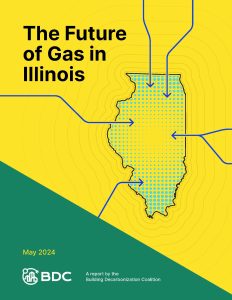 Gas utility customers in Illinois could see the delivery charges on their bills triple in the next decade if regulators do not limit gas utility spending, according to a new analysis released Monday.
Gas utility customers in Illinois could see the delivery charges on their bills triple in the next decade if regulators do not limit gas utility spending, according to a new analysis released Monday.
The Future of Gas in Illinois, from the Building Decarbonization Coalition and Groundwork Data, finds that despite stagnant customer growth in recent years and a projected decline in customers in coming years, Illinois’ four largest gas utilities (Ameren Illinois, Nicor Gas, North Shore Gas and Peoples Gas) have launched aggressive spending plans costing more than $1 billion each year, causing up to 29 percent of customers to fall behind on their gas bills, depending on utility. (This blog article is based on a news release from the Build Decarbonization Coalition. See the full release here.)
The report finds that by 2050, if gas system spending goes unchecked, gas system charges on residential customer bills could top $650 per month during the winter—set costs that do not even include the cost of gas itself. Without regulator intervention, continued gas system investments will create an $80 billion stranded asset risk that taxpayers could be on the hook for.
“If gas infrastructure spending continues at this pace, customers will face unaffordable bills just for the costs of the gas system alone, before they’ve used any fuel at all,” said Panama Bartholomy, executive director of the Building Decarbonization Coalition. “The Illinois Commerce Commission can help residents across the state avoid such unmanageable gas bills with a managed, equitable transition to pollution-free, highly efficient home heating options.”
The Illinois Commerce Commission (ICC) recently opened a Future of Gas proceeding to assess what role gas may play in the state’s clean energy future. The report finds that if the ICC works to limit spending on gas pipelines and implements policies to create a managed, equitable transition off the gas system – the stranded asset risk can be reduced 67 percent by 2050.
“The crippling costs of heating bills has already caused a financial emergency for many Illinois families, and this new study shows that current conditions represent only a fraction of the fiasco to come if spending by gas utilities is not held in check,” CUB Executive Director Sarah Moskowitz said in a statement along with the Illinois PIRG Education Fund.
“Every dollar gas utilities spend on unnecessary fossil fuel infrastructure today creates a multi-decade liability for Illinois utility customers and the public,” added Abe Scarr, director of Illinois PIRG’s Education Fund. “This critical new analysis from the Building Decarbonization Coalition demonstrates just how harmful current gas utility spending levels are and how imperative it is that the Illinois Commerce Commission continue to reform utility practices as it did in its November rate-case decisions.”
In the Chicago area, replacing just one mile of pipeline can cost customers up to $2.8 million. Utilities are incentivized to overinvest in costly pipeline replacement projects since these investments can be billed to customers over several decades, providing a lucrative return for investors. But such spending on gas infrastructure is increasingly out of touch, as Illinois seeks to cut climate pollution and residents take advantage of federal incentives and begin to move to cleaner, zero-emission technologies. As customers leave the gas system, a shrinking pool of customers will be left to pay the cost of gas utility spending.
Rather than large-scale replacement efforts across thousands of miles of pipelines, the report suggests capital spending on the gas system should prioritize repair and renewal of leak-prone pipe over replacement. Additionally, pipeline decommissioning should be considered as a viable alternative for enhancing public safety, enabling residents to transition to efficient electric heating.
“The fact is, entire neighborhoods can be decarbonized for less than it costs to replace gas pipelines,” said Bartholomy. “The current pace of gas system spending is simply unsustainable and not aligned with Illinois climate goals. By strategically redirecting gas infrastructure spending toward clean energy solutions like heat pumps and thermal energy networks, Illinois can protect residents from unbearably high bills.”
Without regulators intervening to rein in spending and manage this transition, low-income residents risk being among the last remaining ratepayers to carry the burden of increasing gas delivery charges. To hold rising costs at bay and protect customers, the report recommends that the ICC start cutting back on pipeline replacements today.
“As is true for regulators across the country, the Illinois Commerce Commission is in a difficult position, but as this report highlights, there are strategies available to them to keep costs in check while aligning the operations of investor-owned gas utilities with the state’s transformational climate goals,” said Dorie Seavey, PhD, report author and Senior Research Scientist at Groundwork Data.
There are positive signs. Late last year, the ICC paused Peoples Gas’ over-budget pipeline replacement project and lowered proposed rate hikes.
“Illinois is at a crossroads. Now is the time to invest in a clean energy future. State regulators can secure these investments while protecting customers by reining in gas utility spending and redirecting investments toward the clean energy future we all need and deserve,” Bartholomy added.

